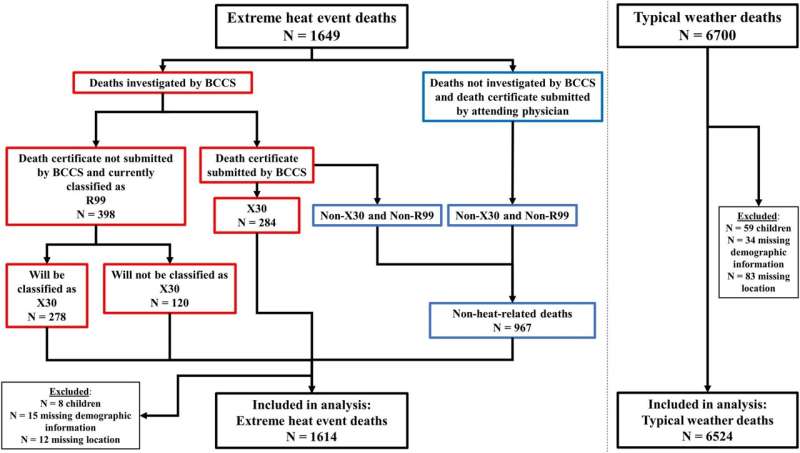This article has been reviewed according to Science X's editorial process and policies. Editors have highlighted the following attributes while ensuring the content's credibility:
fact-checked
proofread
Mental illness can be deadly during heat waves

For one devastating week in June of 2021, parts of western North America reached almost 50°C. The consequences of the extreme heat event went far beyond discomfort. In British Columbia, Canada—one of the hardest hit regions—1,649 people died over an 8-day period, almost doubling the norm and putting the heat wave among Canada's deadliest weather events.
But according to a new study published in GeoHealth, not everyone faced the same risk of dying. Lee and colleagues compared the prevalence of 26 chronic diseases among people who died in British Columbia during the extreme heat event and people who died during the same dates in previous years. They found that mental illnesses were among the conditions that left people most susceptible.
The researchers analyzed administrative health data associated with about 8,000 deaths and found that people with schizophrenia had three times higher odds of dying during the heat event compared with more typical summer weather.
There were also more nuanced links to mental illness. For example, depression was associated with nearly two times higher odds of death from heat. When the researchers considered cases in which the cause of death was listed as "pending" (a common situation caused by reporting delays), they found that people with substance use disorder had a 1.5-fold increase in the odds of death.
Several other studies have linked mental illness to death during extreme heat, but it's not entirely clear why this association exists. Some mental illnesses, including schizophrenia, are associated with a condition called anosognosia that inhibits a person's insight into their own health status. The authors hypothesize that this may leave people unable to perceive the risks of overheating.
Furthermore, people with mental illnesses are often stigmatized, isolated, and economically marginalized, which are all risk factors during extreme heat. Finally, antipsychotic and antidepressant medications, which are necessary to manage some mental illnesses, can affect thermoregulation, so these drugs may leave patients susceptible to overheating.
In addition to mental illnesses, the new research identified other conditions associated with higher odds of death during this heat event, including chronic kidney disease, ischemic heart disease, chronic obstructive pulmonary disease, ischemic stroke, and diabetes. Surprisingly, however, people with dementia, two cardiovascular conditions (angina and hospitalized transient ischemic attack), and osteoporosis had lower odds of dying during the 2021 heat wave than during typical summer weather.
Previous work has shown that dementia and cardiovascular disease increase the risk of death. It's possible that caregivers paid extra attention to people with these ailments during the 2021 heat wave because of those known links, but the researchers were not able to confirm this possibility with the available data. The hope, the scientists say, is that people with mental illness will receive such life-saving attention during future natural disasters.
More information: Michael Joseph Lee et al, Chronic Diseases Associated With Mortality in British Columbia, Canada During the 2021 Western North America Extreme Heat Event, GeoHealth (2023). DOI: 10.1029/2022GH000729
This story is republished courtesy of Eos, hosted by the American Geophysical Union. Read the original storyhere.
















